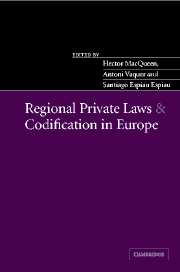Book contents
- Frontmatter
- Contents
- List of contributors
- Acknowledgements
- List of abbreviations
- Introduction
- 1 The civil law in European codes
- 2 ‘A token of independence’: debates on the history and development of Scots law
- 3 The Scottish civil code project
- 4 Scots law in Europe: the case of contract
- 5 Scottish property: a system of Civilian principle. But could it be codified?
- 6 ‘… Quae ad ius Cathalanicum pertinet’: the civil law of Catalonia, ius commune and the legal tradition
- 7 The codification of Catalan civil law
- 8 Unification of the European law of obligations and codification of Catalan civil law
- 9 From revocation to non-opposability: modern developments of the Paulian action
- 10 Epistle to Catalonia: romance and rentabilidad in an anglophone mixed jurisdiction
- 11 Estonia and the new civil law
- 12 The positive experience of the Civil Code of Quebec in the North American common law environment
- 13 From the code civil du bas Canada (1866) to the code civil Quebecois (1991), or from the consolidation to the reform of the law: a reflection for Catalonia
- 14 The evolution of the Greek civil law: from its Roman–Byzantine origins to its contemporary European orientation
- Index
3 - The Scottish civil code project
Published online by Cambridge University Press: 30 July 2009
- Frontmatter
- Contents
- List of contributors
- Acknowledgements
- List of abbreviations
- Introduction
- 1 The civil law in European codes
- 2 ‘A token of independence’: debates on the history and development of Scots law
- 3 The Scottish civil code project
- 4 Scots law in Europe: the case of contract
- 5 Scottish property: a system of Civilian principle. But could it be codified?
- 6 ‘… Quae ad ius Cathalanicum pertinet’: the civil law of Catalonia, ius commune and the legal tradition
- 7 The codification of Catalan civil law
- 8 Unification of the European law of obligations and codification of Catalan civil law
- 9 From revocation to non-opposability: modern developments of the Paulian action
- 10 Epistle to Catalonia: romance and rentabilidad in an anglophone mixed jurisdiction
- 11 Estonia and the new civil law
- 12 The positive experience of the Civil Code of Quebec in the North American common law environment
- 13 From the code civil du bas Canada (1866) to the code civil Quebecois (1991), or from the consolidation to the reform of the law: a reflection for Catalonia
- 14 The evolution of the Greek civil law: from its Roman–Byzantine origins to its contemporary European orientation
- Index
Summary
The nature of the project
The Scottish civil code project is at present an unofficial project, based in the University of Edinburgh. The Scottish Minister for Justice and his officials know of the project but they have neither fully endorsed it nor rejected it. The present position is that the Minister has asked me to prepare a further paper explaining the scope of the project and an illustrative draft of a family law code. I have already submitted an illustrative draft of a general part. So links to the government remain open and work can proceed, even if on a slightly speculative basis for the time being.
The Scottish Law Commission, the statutory body charged with making law reform recommendations in Scotland, also knows of the project and expresses support for it in its latest programme of law reform. It presumably suits the Commission to have this long-term work undertaken outside the Commission because its resources are fully committed to more urgent projects, particularly in the field of property law.
I should emphasise that the aim of the project is a legislated code – enacted by the Scottish Parliament – and not simply a model code or unofficial restatement. It is therefore essential that the government is involved and interested.
Background
Attitudes of the legal community
Support from the legal community for the idea of codification cannot be taken for granted in Scotland.
- Type
- Chapter
- Information
- Regional Private Laws and Codification in Europe , pp. 83 - 101Publisher: Cambridge University PressPrint publication year: 2003



